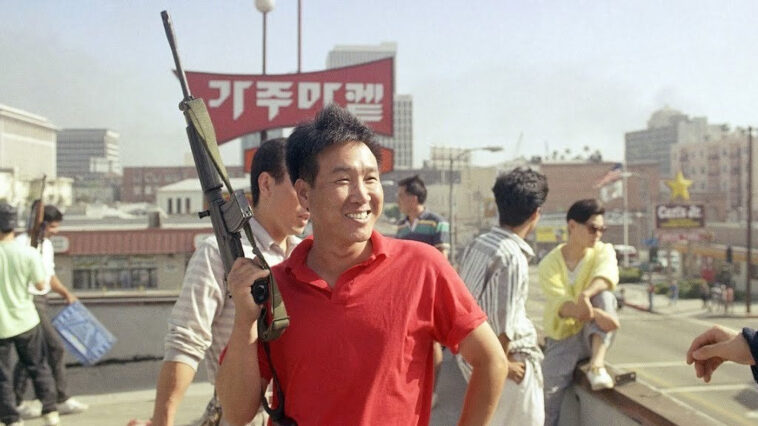During the violent upheavals in Los Angeles in 1992, a group of young men made headlines armed with firearms, securing the bustling Koreatown neighborhood. Nearly three decades later, their actions echo loudly amidst renewed civil unrest and an underfunded, disheartened police force. These men were soon recognized as the ‘Rooftop Koreans’, ordinary citizens taking extraordinary steps to safeguard their community. One of them, Tony Moon, now in his fifties, recounts, “I was an outsider then, barely impacted by the chaos erupting around me.”
The turmoil that was once confined to South Central seemed to expand, crept towards Koreatown, forcing Moon’s father to give up his business there. Despite their residence in Hollywood, distinct from the tinderbox that Koreatown was becoming, Moon couldn’t ignore a friend’s plea for help. At the young age of nineteen, he enlisted in an informal militia of approximately 75 men who aimed to protect the locality from potential looters and vandals.
Strangely enough, their strategy was successful. Transforming their neighbourhood into an island amid the chaos, Koreatown stayed untouched even as the rest of the city succumbed to anarchy. The local law enforcement had capitulated to the rioters, but the tides seemed to turn in Koreatown.
The riots first sparked off after the acquittal of four LAPD officers, filmed brutally assaulting Rodney King during an arrest following a high-speed chase under the influence. The heated unrest spanned six tumultuous days, earning a grim distinction as the most disruptive civil unrest in American history with dozens dead, thousands injured, and property damage amounting to a billion dollars.
During this period, the Korean community in LA felt an acute sense of danger. Racial discord with the African American community was peaking. The shooting of a 15-year-old African American girl, Latasha Harlins, by a Korean shopkeeper the previous year had already intensified racial animosity. Accused of theft, the teenager’s death caused an uproar when the shopkeeper was found guilty, yet merely sentenced to probation.
Following the lenient sentencing, cultural expressions of racial tensions heightened. Rapper Ice Cube’s track ‘Black Korea’ was released, embodying explicit anti-Asian sentiments and posing threats against Korean business owners.
Recalling that turmoil, Moon shares, “The situation was utterly chaotic. We were unsure if this was the beginning of an all-out assault on our community. It was a moment when almost anything could pass without repercussions.” As the city once again witnesses unrest, however, Moon draws a clear distinction between the events of yesteryears and those of recent times.
“The aftermath of the Rodney King case brought out genuine rage and frustration from affected communities—a sentiment I shared,” Moon asserts. Not so with the unrest witnessed in recent years, he feels. “These are not spontaneous uprisings. There’s a notable lack of support at the grassroots level. Having lived through the 2020 BLM-Antifa riots, it’s evident that these incidents are orchestrated, not organic,” Moon expresses.
Moon holds external entities accountable for underwriting the unrest. As a child born in West Germany and arriving in America at 5, he grew up on harrowing tales of life under North Korea’s communist rule. In one such story, his grandfather narrowly avoided execution by North Korean troops, suspected of anti-revolutionary ties.
That close brush with death, as well as American helicopter interference, prompted his family to migrate, settling eventually in the US. As a teenager, facing the chaos ensuing on the Olympic Boulevard and New Hampshire Avenue outside a shopping center, armed with the Remington 870 shotgun he got with his first paycheck, Moon was a champion of his city first, being Korean was secondary.
Despite his youthful indiscretion, Moon managed to turn his life around. “I was a bit wayward in my youth, dropping out of high school. But I eventually realigned my life,” he shares. He went on to become a student at the University of Southern California, studying business and later working as a mortgage lender.
Moon is now a father of two, leading a typical suburban life. Still, when called upon, he didn’t hesitate to aid fellow Koreans stating, “There was a mutual understanding that we need to come together. Many Korean men were willing to step up again and protect our community.” Over the years, this unassuming family man transformed into a staunch political activist.
His activism led him to Washington, DC at one point, to lend his voice to those fighting for election integrity. “Regardless of the stance one takes on an issue, I believe everyone has a right to protest and express their views,” asserts Moon.
However, as more protests against President Trump are being organized, can we expect a replay of 1992’s chaos or 2020’s ‘Summer of Love’? Moon doesn’t believe so. “People can’t be fooled constantly. Revolutionary tactics can’t be repeated mindlessly. People have the ability to discern patterns,” he contends, suggesting that the recent unrest depicted more of a spectacle than genuine collective sentiment.
Moon closes off with a poignant reflection, “I think people are experiencing a sense of riot fatigue. Even those who stood to financially benefit from the chaos.” Although the past can’t be forgotten, the echoes of Koreatown’s defense in 1992 offer lessons of unity, bravery, and resilience. Even in uncertain times, individuals like Tony Moon continue contributing to the conversation and reminding us of historical realities.




